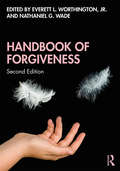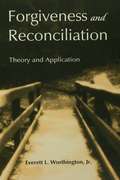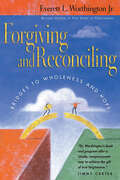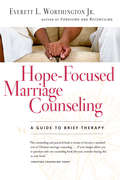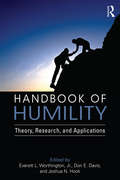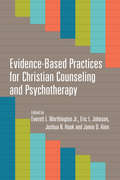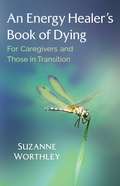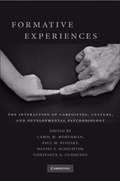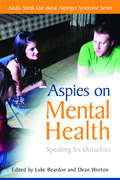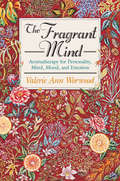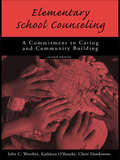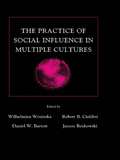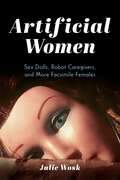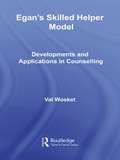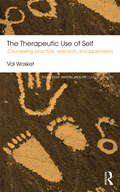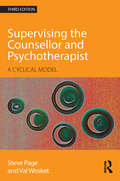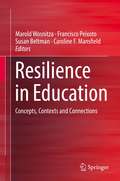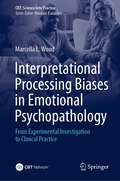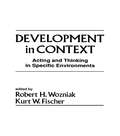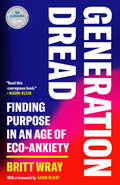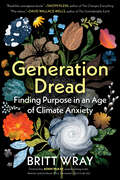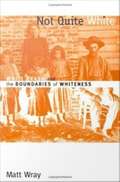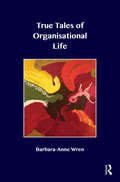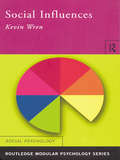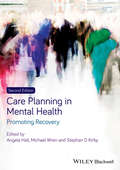- Table View
- List View
Handbook of Forgiveness
by Everett Worthington Nathaniel G. WadeThe Handbook of Forgiveness, Second Edition consolidates research from a wide range of disciplines and offers an in-depth review of the science of forgiveness. This new edition considers forgiveness in a diverse range of contexts and presents a research agenda for future directions in the field. Chapters approach forgiveness from a variety of perspectives, drawing on related work in areas including biology, personality, social psychology, clinical/counseling psychology, developmental psychology, philosophy, and neuroscience, as well as considering international and political implications. The Handbook provides comprehensive treatment of the topic, integrating theoretical considerations, methodological discussions, and practical intervention strategies that will appeal to researchers, clinicians, and practitioners. Reflecting the increased precision with which forgiveness has been understood, theorized, and assessed during the last 14 years of research, this updated edition of the Handbook of Forgiveness remains the authoritative resource on the field of forgiveness.
Forgiveness and Reconciliation: Theory and Application
by Everett L. Worthington, Jr.To be unforgiving is harmful. The inability to come to terms with one’s anger or strife often can lead to stress disorders, mental health disorders, and relationship problems. Forgiveness is a personal decision. Forgiveness and Reconciliation focuses on individual experiences with forgiveness, aiming to create a theory of what forgiveness is and connect it to a clinical theory of how to promote forgiveness. Dr. Worthington creates an evidence-based approach that is applicable for individuals and relationships, and even for society. He also describes an evidence-based method of reconciliation - restoring trust in damaged relationships. Dr. Worthington hopes that this theory will inform scientific research and improve intervention strategies. Showing that forgiveness transforms personality, Worthington describes ways a clinician can promote (but not force) forgiveness of others and self. He provides research-based theory and applications and discusses the role of emotion and specific personality traits as related to forgiveness. Forgiveness and reconciliation might not be cures, but, as Worthington shows, they are tools for transforming both the self and the world.
Forgiving and Reconciling: Bridges to Wholeness and Hope
by Everett L. Worthington Jr.A 2003 Templeton Foundation Book of Distinction
Hope-Focused Marriage Counseling: A Guide to Brief Therapy
by Everett L. Worthington Jr.drawing on central valuespromoting confession and forgivenessstrengthening communicationaiding conflict resolutionchanging patterns of thinkingdeveloping intimacycementing commitment
Handbook of Humility: Theory, Research, and Applications
by Everett L. Worthington Jr. Joshua N. Hook Don E. DavisThe Handbook of Humility is the first scholarly book to bring together authors from psychology as well as other fields to address what we know and don’t know about humility. Authors review the existing research in this burgeoning field that has well over 100 empirical articles and an increasing trajectory of publication. This work should form the basis for research in humility for many years. In this book, chapters address definitions of humility that guide research. Authors also reflect on the practical applications of humility research within the areas they reviewed. The book informs people who study humility scientifically, but it is also an exceptional guide for psychotherapists, philosophers, religious and community leaders, politicians, educated lay people, and those who would like to fuel an informed reflection on how humility might make interactions more civil in relationships, organizations, communities, political processes, and national and international relations.
Evidence-Based Practices for Christian Counseling and Psychotherapy (Christian Association for Psychological Studies Books)
by Everett L. Worthington Jr. Eric L. Johnson Jamie D. Aten Joshua N. Hookdevotional meditationcognitive-behavior therapypsychodynamic and process-experiential therapiescouples, marriage and family therapygroup intervention
An Energy Healer’s Book of Dying: For Caregivers and Those in Transition
by Suzanne WorthleyA compassionate guidebook to the energetic stages of dying and how to offer practical support at each stage of the transition back to spirit • Explains the nine energetic levels of dying and what is happening during each stage, including how belief systems and energy blocks can affect the death process • Reveals what the dying person may see and experience, what to watch for in each stage, and specific ways to support your loved one during each phase • Explores the grieving process and offers helpful strategies for moving through it Written by a highly skilled intuitive energy worker, this compassionate guide reveals what is happening energetically during the transition back to spirit and details how to provide support in any phase of losing a loved one: before death, during the dying process, and afterward. Taking readers step-by-step through the nine energetic levels of dying, author Suzanne Worthley explains what is happening at each level or dimension energetically, what to watch for in each stage, and specific ways in which we can support our loved ones through their transition back to spirit. For each of the nine stages, she describes what the dying person may see and experience, including the stages of transition at which people undergo the familiar elements of near-death experiences, such as entering a tunnel, conducting a life review, or encountering angels, guides, loved ones in spirit, or a bright light. She explores what family members and friends may see and experience, such as spirit energy, and what they can do to offer practical support and emotional solace to their loved one. Examining how life force energy works as well as what Akashic records and soul contracts are, Worthley shares hospice case studies for each level of transition, so caregivers can see how belief systems and energy blocks in specific chakras affect the death process and why it is important to clear energy blocks like fear, anger, or guilt during life if possible. She explores the grieving process and offers helpful strategies for moving through it as well as &“at-a-glance&” reference tables of the nine stages and related healing strategies designed to be referred to by those holding vigil. Shedding light on one of the great mysteries of existence, An Energy Healer&’s Book of Dying offers a compact yet comforting guide to support you through this emotional, grief-filled, and exhausting time and help you bring solace to your loved one during the transition back to spirit.
Formative Experiences: The Interaction of Caregiving, Culture, and Developmental Psychobiology
by Carol M. Worthman Paul M. Plotsky Daniel S. Schechter Constance A. CummingsThe authors offer a unique exploration of the formative effects of children's early life experiences, with an emphasis on interactions among neurodevelopmental, behavioural, and cultural dynamics. Multidisciplinary case studies focus on specific periods of development, or windows of susceptibility, during which care giving and other cultural practices potentially have a long-lasting impact on brain and behaviour. Chapters describe in detail: how social experience interacts with neurodevelopmental disorders; how epigenetic mechanisms mediate the effects of early environment; the interaction of temperament and environmental influences; the implications of early life stress or trauma for mental health and well-being; and the cultural shaping of sexual development and gender identity. The final section translates insights from this work into a fresh appraisal of child-rearing practices, clinical interventions, and global public health policy that affect the mental health and well-being of children around the world.
Aspies on Mental Health
by Dean Worton Edited by Luke BeardonPeople with Asperger Syndrome (AS) can be particularly at risk of developing mental health difficulties such as anxiety and depression. Here, adults with Asperger Syndrome speak out about their own experiences of mental health issues, offering sound advice for other Aspies and providing valuable insights for family, friends and also for mental health professionals. Touching on everything from difficulties at work and college to coping with low self-confidence, self-harm, alcohol, misdiagnosis, sectioning, counselling, medication and battles with mental health services, the book provides a window into how people with AS experience mental health issues, and what can be done to help. The individual accounts describe innovative coping strategies and methods for maintaining emotional and psychological wellbeing as well as practical advice on things like how to stay positive and deal with day-to-day stress and meltdowns. This is essential reading for adults with Asperger Syndrome, and their families and friends, and will be a useful resource for psychologists, psychiatrists, mental health service providers and other professionals who support adults with Asperger Syndrome.
The Fragrant Mind
by Valerie Ann WorwoodThe Fragrant Mind is written in an easy, accessible style for anyone who wishes to learn how essential oils can influence our minds and emotions and how to use aromatherapy to maintain a peaceful equilibrium or bring about positive change. Valerie Worwood's The Complete Book of Essential Oils and Aromatherapy (over 200,000 copies sold) has become the encyclopedia of essential oils and aromatherapy, earning itself the status of a popular household and reference classic. In this companion volume, Worwood concentrates on the emotional, psychological, and mood-changing effects of nature's oils.
Elementary School Counseling: A Commitment to Caring and Community Building
by John C. Worzbyt Kathleen O'Rourke Claire DandeneauFirst published in 2003. Routledge is an imprint of Taylor & Francis, an informa company.
The Practice of Social influence in Multiple Cultures (Applied Social Research Series)
by Wilhelmina Wosinska Robert B. Cialdini Daniel W. Barrett Janusz ReykowskiThis book provides a diverse collection of studies reporting the effects of social influence processes in multiple cultures at both the universal and culture-specific levels. The book is characterized by three distinct features. First, the social influence process is considered as a ubiquitous and pervasive feature of human interaction. Second, the book represents a multicultural approach which includes both cross-cultural and culture-focused examinations. Third, the book emphasizes practical implications of the research presented. This volume incorporates theory and research stemming from three different approaches to social influence: social influence principles across cultures, social influence and social change across cultures, and culture and moral perspective in the social influence process. Because each of these three parts encompasses a considerable variety of research methodologies, social contexts, and cultures, each is proceeded by an integrative commentary authored by one of the book editors. These essays provide syntheses of the topics and themes within the corresponding sections and within the book as a whole. They also offer critical commentaries on both theoretical and methodological issues, raise suggestions for future research, and focus on practical applications. This book is intended for both scholars interested in cross- and multicultural research into the mechanisms of the social influence process and for the professional whose mission is to make planned changes in a society. Knowledge about the influence process, especially regarding how it works in different cultures and within several cultural groups, facilitates this goal. The practical implications ending each chapter serve as encouraging instructions for such applications.
Artificial Women: Sex Dolls, Robot Caregivers, and More Facsimile Females
by Julie WoskWhat distinguishes humanity from artificial beings? What do constructed creatures tell us about ourselves? From sex dolls to Siri, talking Barbies to robotic mothers, Artificial Women explores the ways in which today's simulated females—both real and fictional—reflect and expose our own ideas about gender and female identity. Join Julie Wosk as she probes the realm of compliant sex workers, nurturing caretakers, genial servants, and rebellious creations in film, television, literature, art, photography, and current developments in robotics. These modern-day Galateas must embrace their own synthetic nature while also striving for authenticity and autonomy, all the while foregrounding gender stereotypes and changing perceptions of women and their roles. They embody the paradoxes and tensions that continue to arise in our increasingly simulated world, where the lines between the real and the virtual only continue to blur. As these "artificial women" become ever more lifelike, so too do the questions they raise become more provocative, and more illuminating of our own conceptions and conventions. Artificial Women pushes the boundaries of gender, sexuality, and culture studies to consider new digital technologies, artificial intelligences, and burgeoning simulations.
Egan's Skilled Helper Model: Developments and Implications in Counselling
by Val WosketThe skilled helper model of counselling is hugely influential in the helping professions. Egan's Skilled Helper Model brings a number of new and challenging perspectives to bear on Egan's work and makes a major contribution to the development of this problem-management and opportunity-development approach to helping. Val Wosket draws on over twenty years experience of counselling, training and supervising to provide a clear exposition of the model and situate it in contemporary counselling practice. Numerous case studies are provided throughout, along with contributions from experienced practitioners, illustrating how the model can be applied in a variety of clinical settings and with a range of counselling issues. Egan's Skilled Helper Model builds on and extends the aims of Egan's original work, covering key topics, including: Developing a client-responsive approach that places the therapeutic relationship at the heart of the model Applying the skilled helper model in research, training and supervision Translating the model into more accessible and adaptable language This book provides an invaluable resource for trainees, trainers, supervisors and experienced practitioners wishing to update their knowledge of the model. It will also be of great interest to anyone in the helping professions looking for a pragmatic integrative framework that is adaptable to a diverse range of client issues and contexts.
The Therapeutic Use of Self: Counselling practice, research and supervision (Routledge Mental Health Classic Editions)
by Val WosketThe Therapeutic Use of Self has continued, since its publication in 1999, to be considered a key text within integrative, humanistic and relational approaches for the training and development of therapists in the UK and abroad. This long-awaited classic edition includes powerful case examples and extensive research findings, presenting the counsellor’s evaluation of their own practice as the main vehicle for the development of insight and awareness into individual ‘therapeutic’ characteristics. The book addresses many of the taboos and infrequently discussed aspects of therapy, such as: The value of therapist failure Breaking the rules of counselling Working beyond the accepted boundaries of counselling. The Therapeutic Use of Self will help professionals and trainees acknowledge, develop and value their own unique contribution to counselling and psychotherapy. The book remains a ground-breaking examination of the individual therapist’s contribution to process and outcome in counselling and supervision.
Supervising the Counsellor and Psychotherapist: A cyclical model
by Val Wosket Steve PageSupervising the Counsellor and Psychotherapist considers how to meet the supervision needs of trainee and experienced counsellors, psychotherapists and other helping professionals using an integrative approach that will appeal to practitioners from a broad range of backgrounds and theoretical persuasions. The book charts the development of the supervisor as he or she moves through making the transition from therapist to supervising the work of others and includes consideration of the advanced competencies required to supervise experienced practitioners. This third edition brings a number of contemporary perspectives to a well-known and widely respected core text for the training and development of supervisors. The Cyclical Model at the heart of the book has established its relevance in the UK as one of the best known frameworks for teaching and learning the steps and stages of supervision. All chapters in this new edition have been extensively revised and updated, and key elements include: - Two brand new chapters on deepening supervision practice and moving beyond supervising counsellors and psychotherapists - Updates on recent developments in supervision, including research outcomes, the use of technology and supervising short-term work - Creativity, play and the use of metaphor and imagery in supervision - Developing the use of self through relational supervision. Supervising the Counsellor and Psychotherapist is a key text for trainee and experienced supervisors of counsellors and psychotherapists, those who train supervisors, and supervisees wishing to better understand the supervisory process.
Resilience in Education: Concepts, Contexts and Connections
by Marold Wosnitza Francisco Peixoto Susan Beltman Caroline F. MansfieldThis volume focuses on resilience in educational contexts which has emerged as an important field of research, with recent investigation into resilience of school students teachers, and post-secondary students and staff. The book integrates theoretically diverse viewpoints and research advancing relevant theory. It furthermore presents interventions which aim enhancing resilience in the educational context. The interplay between more basic research and actual practice in the classroom, university or workplace enriches relevant theory and research. Each chapter includes an explanation of how resilience is conceptualized in the research and the methods used to examine resilience. The chapters also provide a description of the context in which the research was conducted and how particular aspects of context influence the resilience process. Innovative approaches to exploring resilience are highlighted as well as directions for future research.
Interpretational Processing Biases in Emotional Psychopathology: From Experimental Investigation to Clinical Practice (CBT: Science Into Practice)
by Marcella L. WoudThe primary aim of this book is to bridge the gap between lab-based and clinical research by disseminating the latest interdisciplinary scientific findings on interpretational processing biases in the context of emotional psychopathology. It is designed to help the practitioner by drawing explicit links between the basic science and implications for clinical practice. This enables an enhanced interaction between science and practice, strengthening bi-directional translational links, and the potential to produce more meaningful and significant advances in the treatment of emotional psychopathology. This in turn will facilitate an innovative step-change in the area of both research and clinical practice. The book focuses on cognitive processing biases that are common across a wide range of psychological disorders, meaning that the conclusions drawn have relevance across the whole spectrum of psychopathology and will stimulate and inspire a broad range of discussions and future work. From the foreword by Nikolaos Kazantzis:"The practice of CBT is complex and requires a tailored approach. Every technique has a specific target but may be used for multiple purposes simultaneously in support of the client’s therapeutic goals. The purpose of Dr. Woud’s book is to elucidate the ways in which interpretational biases can be a focus of intervention for CBT therapists at all stages of professional development, from those undertaking training to master clinicians. Dr. Woud has succeeded admirably in this regard."
Development in Context: Acting and Thinking in Specific Environments (Jean Piaget Symposia Series)
by Robert H. Wozniak Kurt W. FischerIn this volume leading developmentalists address the question of how children's thinking develops in context by drawing on the theories of Vygotsky, Gibson, and Piaget. Analyses of the ecology and the dynamics of behavior have become popular, emphasizing the particulars of people acting in specific environments and the many complex factors of human body and mind that contribute to action and thought. This volume brings together many of the current efforts to deal with development in this richly ecological, dynamic way. The research reported demonstrates that recent years have produced major shifts in approach. Activities are studied as they naturally occur in everyday contexts. Children's active construction of the world around them is treated as fundamentally social in nature, occurring in families, with peers, and in cultures. Behavior is studied not as something disembodied but within a rich matrix of body, emotion, belief, value, and physical world. Behavior is analyzed as changing dynamically, not only over seconds and minutes, but over hours, days, and years.
Generation Dread: Finding Purpose in an Age of Climate Crisis
by Britt WrayFINALIST FOR THE GOVERNOR GENERAL'S LITERARY AWARDA CBC BEST CANADIAN NONFICTION BOOK OF 2022AN INDIGO TOP TEN BEST SELF-HELP BOOK OF 2022"A vital and deeply compelling read.&” —Adam McKay, award-winning writer, director and producer (Don&’t Look Up)&“Britt Wray shows that addressing global climate change begins with attending to the climate within.&” —Dr. Gabor Maté, author of The Myth of Normal"Read this courageous book.&” —Naomi KleinAn impassioned generational perspective on how to stay sane amid climate disruption.Climate and environment-related fears and anxieties are on the rise everywhere. As with any type of stress, eco-anxiety can lead to lead to burnout, avoidance, or a disturbance of daily functioning. In Generation Dread, Britt Wray seamlessly merges scientific knowledge with emotional insight to show how these intense feelings are a healthy response to the troubled state of the world. The first crucial step toward becoming an engaged steward of the planet is connecting with our climate emotions, seeing them as a sign of humanity, and learning how to live with them. We have to face and value eco-anxiety, Wray argues, before we can conquer the deeply ingrained, widespread reactions of denial and disavowal that have led humanity to this alarming period of ecological decline.It&’s not a level playing field when it comes to our vulnerability to the climate crisis, she notes, but as the situation worsens, we are all on the field—and unlocking deep stores of compassion and care is more important than ever. Weaving in insights from climate-aware therapists, critical perspectives on race and privilege in this crisis, ideas about the future of mental health innovation, and creative coping strategies, Generation Dread brilliantly illuminates how we can learn from the past, from our own emotions, and from each other to survive—and even thrive—in a changing world.
Generation Dread: Finding Purpose In An Age Of Climate Anxiety
by Britt Wray“Generation Dread is a vital and deeply compelling read.”—Adam McKay, award-winning writer, director, and producer (Vice, Succession, Don’t Look Up) “Read this courageous book.”—Naomi Klein, author of This Changes Everything “Wray shows finally that meaningful living is possible even in the face of that which threatens to extinguish life itself.”—Dr. Gabor Maté, author of When the Body Says No When we’re faced with record-breaking temperatures, worsening wildfires, more severe storms, and other devastating effects of climate change, feelings of anxiety and despair are normal. In Generation Dread, Britt Wray reminds us that our distress is, at its heart, a sign of our connection to and love for the world. The first step toward becoming a steward of the planet is connecting with our climate emotions—seeing them as a sign of our humanity and empathy and learning how to live with them. Britt Wray, a scientist and expert on the psychological impacts of the climate crisis, brilliantly weaves together research, insight from climate-aware therapists, and personal experience, to illuminate how we can connect with others, find purpose, and thrive in a warming, climate-unsettled world.
Not Quite White: White Trash and the Boundaries of Whiteness
by Matt WrayWhite trash. The phrase conjures up images of dirty rural folk who are poor, ignorant, violent, and incestuous. But where did this stigmatizing phrase come from? And why do these stereotypes persist? Matt Wray answers these and other questions by delving into the long history behind this term of abuse and others like it. Ranging from the early 1700s to the early 1900s, Not Quite White documents the origins and transformations of the multiple meanings projected onto poor rural whites in the United States. Wray draws on a wide variety of primary sources--literary texts, folklore, diaries and journals, medical and scientific articles, social scientific analyses--to construct a dense archive of changing collective representations of poor whites. Of crucial importance are the ideas about poor whites that circulated through early-twentieth-century public health campaigns, such as hookworm eradication and eugenic reforms. In these crusades, impoverished whites, particularly but not exclusively in the American South, were targeted for interventions by sanitarians who viewed them as "filthy, lazy crackers" in need of racial uplift and by eugenicists who viewed them as a "feebleminded menace" to the white race, threats that needed to be confined and involuntarily sterilized. Part historical inquiry and part sociological investigation, Not Quite White demonstrates the power of social categories and boundaries to shape social relationships and institutions, to invent groups where none exist, and to influence policies and legislation that end up harming the very people they aim to help. It illuminates not only the cultural significance and consequences of poor white stereotypes but also how dominant whites exploited and expanded these stereotypes to bolster and defend their own fragile claims to whiteness.
True Tales of Organisational Life: Using Psychology to Create New Spaces and Have New Conversations at Work
by Barbara-Anne WrenThe context in which healthcare is delivered continues to be one of extreme organisational turbulence and increasing workload, factors that exacerbate the anxiety felt by staff about keeping themselves, and their patients, truly safe. At the same time there is a focus on so-called 'failures of compassion' in healthcare services. The need for creative conversations to promote flexibility, hope and resilience in staff has never been greater. In True Tales of Organisational Life, the author describes ways in which space can be created to strengthen the capacity to withstand suffering, whilst acknowledging the creativity and meaningfulness of healthcare work. She describes the application of systemic and narrative psychology to develop interventions at an individual, team, group, and organisational level. The success of these interventions to develop caregivers' confidence to manage the relationships with their patients and with themselves, as opportunities for healing and compassion, is compelling. Case studies illuminate the work described throughout, and the link between storytelling and health is explored.
Social Influences (Routledge Modular Psychology)
by Kevin WrenSocial Influences looks at how we perceive ourselves and others and how this can influence our behaviour. It includes stereotyping and prejudice, obedience and conformity, collective behaviour and leadership.
Care Planning in Mental Health
by Mike Wren Angela Hall Stephan KirbyCare planning and delivery are essential parts of everyday practice for all mental health practitioners. This new edition of Care Planning in Mental Health: Promoting Recovery moves away from a professionally-oriented model of care planning towards the active promotion of the personal narrative as being central to planning effective mental health care. It outlines essential concepts linked to the recovery process which is carried out in partnership with people with mental health problems and those closest to them.New to this edition:A stronger, more explicit focus on recoveryA unique interpretation and explication of the recovery processA greater promotion of the centrality of personhoodExamples drawing on a range of international perspectives and experiencesEnhanced user-friendly pedagogy, including practical case illustrations and first-hand accounts throughoutCare Planning in Mental Health: Promoting Recovery is an ideal resource for anyone involved in the field of mental health care. It is also a valuable learning resource for students studying mental health care and the qualified and experienced practitioner wishing to gain a fresh approach to planning recovery-focused care.
